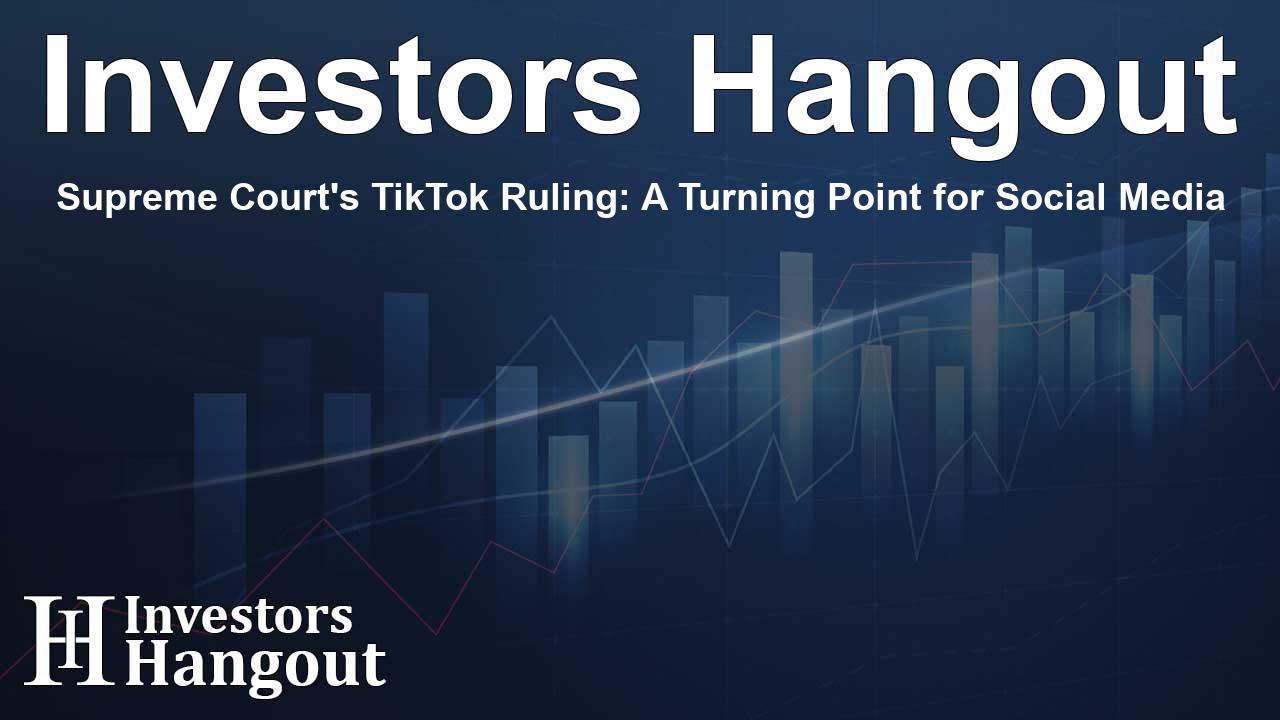Supreme Court's TikTok Ruling: A Turning Point for Social Media

Supreme Court's Ruling on TikTok: Implications and Reactions
The U.S. Supreme Court has made a significant ruling against TikTok, enforcing a new law that requires the popular short-video app to be sold by its Chinese parent company, ByteDance, or risk a complete ban in the United States. This decision, resting on national security concerns, marks a notable development for a platform that boasts a user base of nearly 270 million American followers.
Navigating Free Speech and National Security
The justices determined that the law does not infringe upon First Amendment rights. This ruling effectively overturns a prior decision from a lower court that had supported TikTok’s position against the law. Although the court acknowledged TikTok's vital role as a means of expression for its users, it stated that national security considerations relating to the app's data practices and its ties to a foreign government compelled Congress to insist on divestiture.
Understanding the National Security Concerns
According to the Supreme Court, the law serves to protect Americans from potential national security threats arising from data collection practices that may compromise individual privacy and security. By maintaining ties with China, TikTok is seen as a potential conduit for the Chinese government to access sensitive user data, which creates an unsettling dynamic considering the current geopolitical climate.
Impact on Users and Advertisers
With an extensive reach among young Americans, TikTok stands to affect not just its user base but also advertisers and content creators who rely on the platform for engagement. TikTok has expressed concern that the law jeopardizes the First Amendment rights of its operations and the rights of its users, highlighting the possible ramifications should the app be forced out of the market.
Political Opinions on TikTok's Future
The reaction to this decision varies across the political spectrum. While the Biden administration supports the law as a measure against foreign ownership of social media platforms, the situation poses questions regarding digital free speech. Former President Donald Trump has changed his stance compared to his previous administration’s approach, advocating for TikTok's viability in a complex political environment.
Challenges Ahead for TikTok
TikTok’s CEO, Shou Zi Chew, acknowledges the challenges ahead, as the app risks discontinuing its U.S. operations if it cannot navigate the legal barriers. The company has 7,000 employees in the United States, and their future hangs in the balance as this unfolding situation develops. With the law prohibiting services to foreign-controlled apps, TikTok’s presence in U.S. app stores is critical to its survival.
Conclusion: The Future of TikTok in America
TikTok’s potential exit from the U.S. digital landscape has far-reaching implications, not just for its users but for the broader social media ecosystem. As this situation unfolds, the effects on advertising, content creation, and community engagement will likely be pronounced as stakeholders navigate these complex legislative and political waters.
Frequently Asked Questions
What is the primary reason for the Supreme Court's ruling against TikTok?
The ruling stems from national security concerns associated with TikTok's data practices and its relationship with its Chinese parent company, ByteDance.
How many users does TikTok have in the U.S.?
TikTok has approximately 270 million users in the United States, making it one of the most popular social media platforms.
What might happen if TikTok does not sell its operations?
If TikTok does not divest, it faces a ban in the United States which would significantly impact its user base and operations.
How does the ruling affect the First Amendment rights of TikTok users?
The Supreme Court determined that the law does not violate First Amendment rights, placing national security above concerns about free speech related to TikTok.
What are the potential consequences for TikTok's content creators?
Content creators may experience disruptions to their audience and revenue streams if TikTok is forced to halt operations in the U.S. due to legal restrictions.
About The Author
Contact Hannah Lewis privately here. Or send an email with ATTN: Hannah Lewis as the subject to contact@investorshangout.com.
About Investors Hangout
Investors Hangout is a leading online stock forum for financial discussion and learning, offering a wide range of free tools and resources. It draws in traders of all levels, who exchange market knowledge, investigate trading tactics, and keep an eye on industry developments in real time. Featuring financial articles, stock message boards, quotes, charts, company profiles, and live news updates. Through cooperative learning and a wealth of informational resources, it helps users from novices creating their first portfolios to experts honing their techniques. Join Investors Hangout today: https://investorshangout.com/
The content of this article is based on factual, publicly available information and does not represent legal, financial, or investment advice. Investors Hangout does not offer financial advice, and the author is not a licensed financial advisor. Consult a qualified advisor before making any financial or investment decisions based on this article. This article should not be considered advice to purchase, sell, or hold any securities or other investments. If any of the material provided here is inaccurate, please contact us for corrections.
